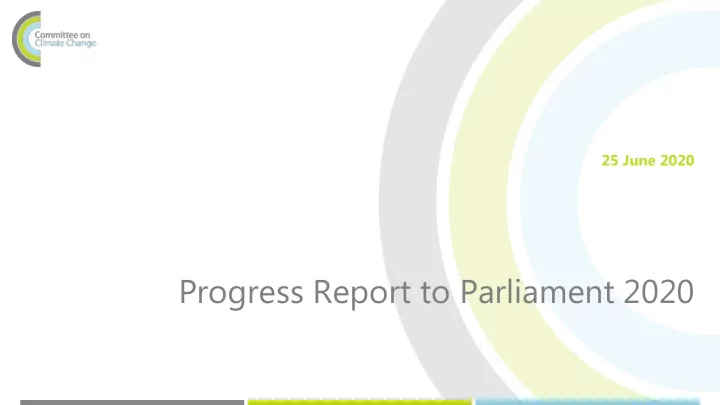

25 June 2020 Progress Report to Parliament 2020
1. Introduction Chris Stark, Chief Executive, Committee on Climate Change 2. Report welcome Darren Jones MP, Chair, BEIS Select Committee 3. Overview of recommendations Lord Deben, Chairman, Committee on Climate Change 4. Presentation of findings Chris Stark, Chief Executive, Committee on Climate Change 5. Government response The Rt Hon George Eustice MP, Secretary of State for Environment, Food and Rural Affairs 6. Q&A Chaired by Jo Barrett, Head of Communications, Committee on Climate Change 2
Finding certainty in the long-term priorities Source : CCC analysis @ChiefExecCCC 3
Content of the report 1. A review of the climate challenge after COVID-19 Introduction setting out the new context for climate policy in the UK. 2. Progress since 2008 Look back at progress reducing emissions globally and in the UK since 2008, including territorial and consumption accounting. 3. Lessons learned since 2008 Look back at themes since the Climate Change Act was passed and how they can inform future policy. 4. Progress on emissions, indicators and policy in the last year Deep dive into developments of the last 12 months. 5. Planning a resilient recovery The role for climate policies in the economic recovery following the COVID-19 crisis. 6. What is needed now – UK climate policy Climate policy priorities that need to be tackled across Government and beyond, especially in the coming year. @ChiefExecCCC 4
Progress on emissions Greenhouse gas emissions vs GDP over time Source : BEIS (2020) 2019 UK Greenhouse Gas Emissions, Provisional Figures; BEIS (2020) 2018 UK Greenhouse Gas Emissions, Final Figures; ONS (2020) Gross Domestic Product: chained volume measures: Seasonally adjusted £m; Defra (2019) UK’s carbon footprint; CCC analy sis @ChiefExecCCC 5
Progress on emissions Decomposition of the UK’s consumption emissions footprint in 2017 Source : Defra (2019) The UK’s carbon footprint; CCC analysis @ChiefExecCCC 6
Progress on emissions Decomposition of the UK’s consumption emissions footprint in 2017 Source : Defra (2019) The UK’s carbon footprint; CCC analysis @ChiefExecCCC 7
Progress on emissions Decomposition of the UK’s consumption emissions footprint in 2017 Source : Defra (2019) The UK’s carbon footprint; CCC analysis @ChiefExecCCC 8
Progress on emissions UK greenhouse gas emissions by sector 1990-2019 Change in emissions 2008- 2018 (MtCO₂e) Emissions (MtCO2e) 0 250 -20 200 -40 -60 150 -80 -100 100 -120 F-gases Power Industry Waste Shipping Surface transport Agriculture Aviation Buildings & LULUCF 50 0 1990 1995 2000 2005 2010 2015 Source : BEIS (2020) 2019 UK Greenhouse Gas Emissions, Provisional Figures; BEIS (2020) 2018 UK Greenhouse Gas Emissions, Final Figures @ChiefExecCCC 9
Summary policy progress Sectoral policy Cross-economy coordination Transport Net Zero as headline goal ≤2035 EV switch Transport strategy in development HGVs Industry Cabinet Committee set up Some industry funds CCS plans No industry or Hydrogen strategies HMT Funding Review underway Buildings UK ETS will reflect Net Zero Future Homes Heat and Buildings strategy must transform heating Power Climate Assembly Offshore wind, onshore wind & solar Flexibility for energy system Progressed Agriculture and land use change In development Agriculture & Environment Bills in development Funding for woodland & peat Policy gap 10
Impact of COVID-19 Source : Le Quéré , C. et al. (2020) Temporary reduction in daily global CO₂ emissions during the COVID -19 forced confinement. @ChiefExecCCC 11
Impact of COVID-19 Source : COBR (2020) Datasets to accompany coronavirus press conference: 4 June 2020; CCC analysis. @ChiefExecCCC 12
COVID-19 recovery priorities Letter to Prime Minister Boris Johnson Building a resilient recovery from the COVID-19 crisis 1. Use climate investments to support the economic recovery and jobs. 2. Lead a shift towards positive long-term behaviours. 3. Tackle the wider ‘resilience deficit’ on climate change. 4. Embed fairness as a core principle. 5. Ensure the recovery does not ‘lock - in’ greenhouse gas emissions or increased climate risk. 6. Strengthen incentives to reduce emissions when considering fiscal changes. Source: CCC (May 2020) @ChiefExecCCC 13
Resilient recovery policies Infrastructure investment Supporting people Driving the pace of transition • • • Housing retrofits; small business Reskilling & Retraining Carbon taxes energy efficiency; district heating • • Nature recovery ‘Green strings’ for bail -outs • Local area energy plans & green • • building passports Remote working & e.g. remote NHS Science & Innovation • • • Electricity, CO 2 , H 2 networks Cycling and walking Climate risk assessments • EV charging Taking a global lead • Flood defences • UK as UN lead on “Inclusive and sustainable r ecovery” • Circular economy 14
What must come next Source : CCC analysis based on BEIS (2019) Updated energy and emissions projections 2018, and BEIS (2020) Provisional UK greenhouse gas emissions national statistics 2019. @ChiefExecCCC 15
Recommend
More recommend